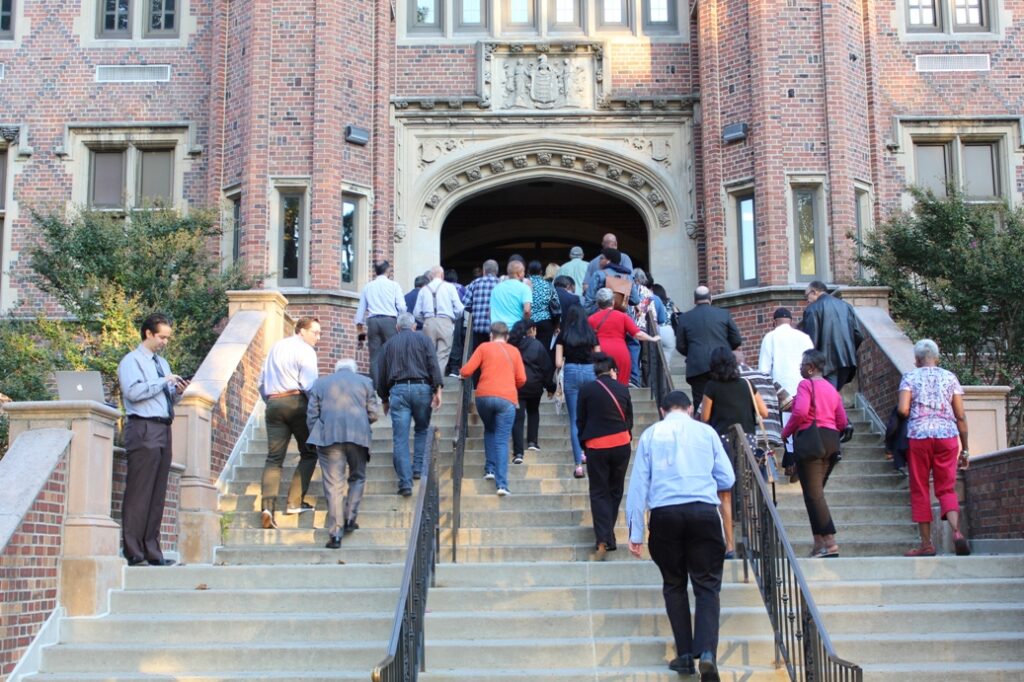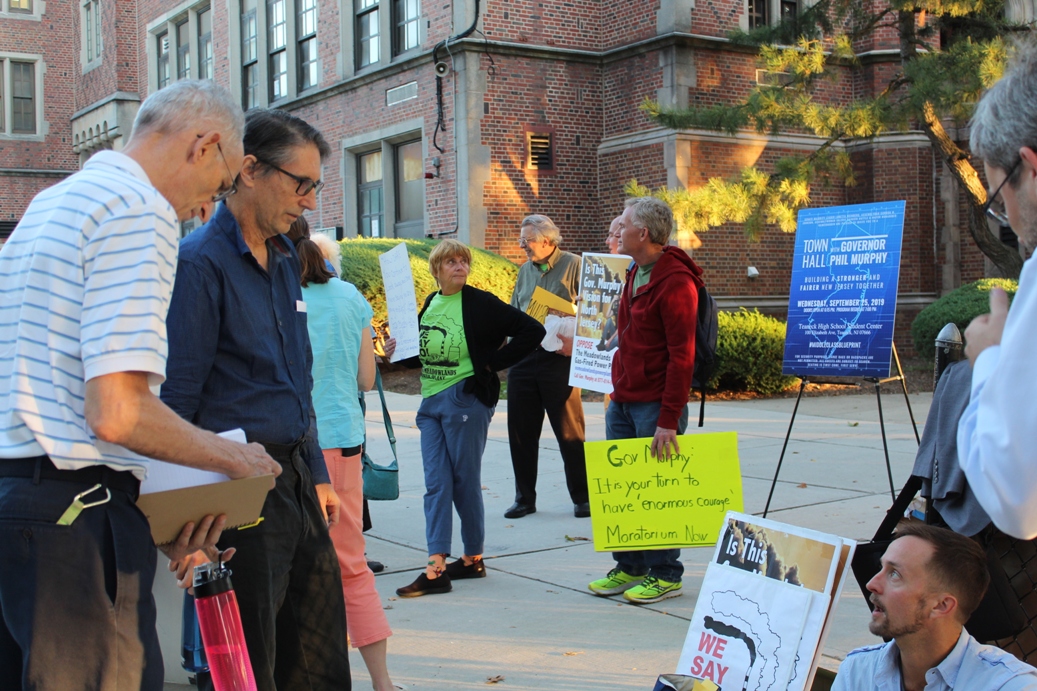In Teaneck, Town Hall-Trotting Murphy Must Contend with Enviros

TEANECK – Governor Phil Murphy arrived Wednesday evening to speak at a town hall at the local high school. In the audience and gathered outside, however, were members of Empower NJ, led by Matthew Smith, Senior Organizer for Food and Water Watch, distributing pamphlets and holding signs, to send a signal to the governor that they felt his action—or, more specifically, lack of action—on climate change, where global warming threatens the ecology of the Earth, was also so much hot air.
The demonstrators carried signs, some from print outs, others home-made, opposing fossil fuels projects such as the Meadowlands Power Plant which, they say, would contribute to carbon dioxide output, the exact opposite of what environmentalists say is critical in the struggle against the destructive effects from greenhouse gases.
“We’re here today in a climate emergency,” Smith said as fellow demonstrators began gathering outside the high school. “It’s pretty clear that the latest science tells us we have a decade to dramatically reshape our energy systems, to get onto 100% renewable energy, specifically the US Climate Assessment and the UN International Panel on Climate Change give us just about a decade to cut economy-wide greenhouse gas emissions in half. To do that we are calling for Governor Murphy to stick to his commitment to rapidly move the state to 100% clean energy sources. Thus far the governor has failed the litmus test.”
As far as Smith is concerned, Murphy might talk the talk, but hasn’t walked the walk. “He continues to say all the right things when he is front of the camera, just this past Friday he was Tweeting about how he stands in solidarity with Greta [Thunberg] and the climate strikers, and he was on a panel talking about states and their action on climate and energy, and he was claiming that he’s the strongest governor on climate change in the country. He dared us to find a governor who did more. Meanwhile, his energy master plan is full of dirty energy loopholes. He has cynically redefined 100% clean energy, which he campaigned on, to 100% carbon neutral. What that means is that the state can continue to develop and operate fracked gas power plants and pipelines, other fossil fuel power plants with carbon capture, we can still rely on things like trash incineration which are poisoning communities like Newark and Camden.”
While some believe that emerging technologies can be the solution to the climate crisis, as yet, there has not been a practical, scalable system found to be effective. Experimental systems in Iceland have worked on the theory of active atmospheric scrubbing, but with that comes its own host of energy challenges. Others have postulated grand ideas of evaporative pools which would passively react with latent carbon dioxide, which still exist only in the theoretical realm. Taking carbon out of the exhaust from the sources of production might seem like an ideal place to start, but as yet, still no rubber has hit the road. “Carbon capture doesn’t work,” Smith said. “There is not a single instance globally of a commercially viable carbon capture power plant on the planet. Yet here we are with a decade to cut emissions, and Governor Murphy’s calling for technology to hit our mark that doesn’t yet exist, it’s not yet viable. We have the solutions: they are solar, wind, energy storage.”
While Governor Murphy might say that New Jersey is leading the way forward, according to Smith, that torch is really just smoke. “There are seven other states that have far more aggressive plans than Governor Murphy’s in terms of promoting renewables and saying no to fossil fuel projects. The first rule is to stop digging. Governor Murphy needs to unite with us behind the science and put a moratorium on new fossil fuel projects. There are fifteen of those currently proposed or moving forward in the state. If they go forward, they will increase our greenhouse gas footprint by over thirty percent. Like the Meadowlands Power Plant, a stone’s throw from here in North Bergen Township.”
“The governor has also talked a lot about environmental justice,” Smith said, jabbing at one of the fields Murphy has wanted to define himself as a champion. “He wants to commit to standing up for New Jersey’s vulnerable communities who have long suffered the disproportionate pollution impacts from things like power plants. The governor has a golden opportunity to live up to those words by coming out and opposing the Meadowlands Power Plant. We have been calling on him to do that for over a year and he has yet to take a stand. We believe that we are building a people-powered movement, as evidenced by, not just the 4 million people worldwide, but the tens of thousands of New Jerseyans who took part in the historic day of action for the climate with walk outs at schools, at work, people taking to the streets, and demanding more, bold action that is adequate to the crisis that we face today.”
Politically, Smith made the case for the governor to take action on the most basic of levels, and one of the most dear to any elected official: his image. “Governor Murphy has a choice, he can unite with us or he can see his environmental legacy go up in flames.”
As India and China are, globally, among the largest polluters in the world, Smith did not shrug off the United States’ role and responsibility to lead, attributing much of the destructive byproducts of Asian manufacturing output directly to American consumer demand. In other words, Americans were not off the hook, despite the progress that has been made, especially in comparison to other countries. “Much of the pollution coming from China and India is to produce consumable goods for the United States. We are 100% implicit in the increase of dirty power in those countries. I would also say that China is far outpacing us in deploying solar technology. They are currently the world leader in solar manufacturing. We are lagging far behind. The US has a special responsibility as the leader of the free world, and as the country many developing countries look to as the model for how to develop their countries economically. Historically, we are the number one responsible polluter for our global climate crisis. We have put more CO2 and greenhouse gases into the atmosphere, over time, than any other country on the planet. We have a unique responsibility to utilize our wealth, technology, and intellectual capital to lead the transition to 100% clean energy.”

Empower NJ’s literature salvoed the governor and Smith lamented New Jersey’s lack of initiative, which he lays at the feet of Murphy—once the great hope of New Jersey environmentalists.
Seven other states, he said, left New Jersey in the proverbial dust as far as climate policy was concerned. “Keep in mind that Governor Murphy said New Jersey would be 100% renewable by 2050 but he switched it to ‘carbon neutral’. So that doesn’t even mean 100% clean. It means you can produce carbon but somehow we’re going to magically deal with off-sets and carbon credits, things like cap and trade, and be net zero. But Hawaii is 100% set to be real renewable by 2045. New York, 70% electricity generated by renewables by 2030, 100% carbon-free by 2040. New Mexico will be carbon-free by 2045. Washington, 100% carbon neutral by 2030, that’s twenty years ahead of the governor’s goal. California, 100% carbon-free by 2045; Nevada 50% renewable by 2030, 100% carbon-free by 2050. He says he’s the best? Murphy is behind all of these states. Colorado, Arizona, some of these,” Smith added, “are Republican states.” It was a pointed observation, perhaps to bristle Democrat purists, ideologues, and progressives, that even the dreaded GOP, with its generally poor environmental reputation, can try to tackle the climate crisis. This mention might come as a further zing to Murphy, who would be speaking mere yards away in the high school, when one notes that President Trump—who sets the tone of the party to the chagrin of some New Jersey establishment Republicans—withdrew the US from the Paris Climate Accord, originally entered into by President Obama. “So, the governor really has nothing to stand on for that claim. It’s more hot air from the administration.”
As far as the governor’s progressive credibility stood, Smith believed that Murphy has the power to do good, if only he would act on it, the key point of frustration for the demonstrators holding their signs, waiting to make themselves known to the state’s chief executive. “I would say that in many ways Governor Murphy is on the right side of the issues when it comes to standing up for teachers and public workers, pensions, but specifically with the climate crisis and this issue of 15 fossil fuel expansion projects, he’s failing the test. He’s failing to use his authority, he’s hiding behind weak excuses that he can’t stop these projects, he’s caving to political special interest, and we need a governor who is willing to stand up to the fossil fuel industry. The science will not negotiate. We have a decade to do this and we need bold leaders who are committed to that cause.”
A flyer distributed by Empower NJ said that “Governor Murphy’s failure to stand up to the fossil fuel industry is one of the reasons why New Jerseyans are joining the climate strikes. Instead of more photo ops and rhetoric, Governor Murphy has to act and move forward to become a leader in combating climate change.” Among the goals EmpowerNJ advances, lest Murphy be “just more hot air”, include 12,000 megawatts from offshore wind sources and legislation to make New Jersey 100% renewable by 2030 and carbon-free by 2050.
“Greenhouse gas emissions have actually increased on Murphy’s watch,” a statement from Empower NJ read, charging that Murphy has “failed to even regulate” greenhouse gases and that the increase comes from the 2018 startup of the PSE&G gas-powered plant in Woodbridge.
A member of the Sierra Club, joining with Empower NJ, said that he was disappointed with Governor Murphy. “We campaigned for him,” and said that Murphy could find his waterfront house eventually under water from rising sea levels, should climate action not be taken. The Sierra Club, which had been an ardent supporter of Governor Murphy when he was campaigning, has been an even more vocal opponent, feeling the governor has betrayed his environmentalist promises.
When asked what the first course of action Governor Murphy should take, to make progress in the climate struggle and perhaps also reestablish some of his credibility, Smith did not miss a beat. “The first step to addressing the crisis to stop digging and in New Jersey that means no more fossil fuel projects. We cannot approve or allow these 15 projects to move forward, some of which were approved the governor himself or allowed to move forward: things like the Roseland Compressor Station, the Pinelands Pipeline through Burlington County, we can’t allow these to go forward and fight climate change at the same time. So, if the governor wants to live up to his rhetoric, he’s got to put a moratorium in place. Step one.”







Leave a Reply